Comcast 2014 Annual Report Download - page 42
Download and view the complete annual report
Please find page 42 of the 2014 Comcast annual report below. You can navigate through the pages in the report by either clicking on the pages listed below, or by using the keyword search tool below to find specific information within the annual report.-
 1
1 -
 2
2 -
 3
3 -
 4
4 -
 5
5 -
 6
6 -
 7
7 -
 8
8 -
 9
9 -
 10
10 -
 11
11 -
 12
12 -
 13
13 -
 14
14 -
 15
15 -
 16
16 -
 17
17 -
 18
18 -
 19
19 -
 20
20 -
 21
21 -
 22
22 -
 23
23 -
 24
24 -
 25
25 -
 26
26 -
 27
27 -
 28
28 -
 29
29 -
 30
30 -
 31
31 -
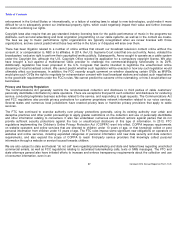 32
32 -
 33
33 -
 34
34 -
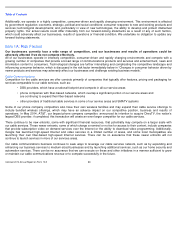 35
35 -
 36
36 -
 37
37 -
 38
38 -
 39
39 -
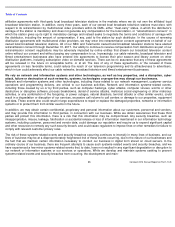 40
40 -
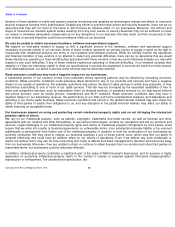 41
41 -
 42
42 -
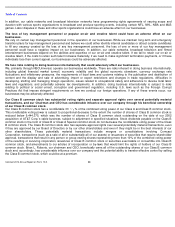 43
43 -
 44
44 -
 45
45 -
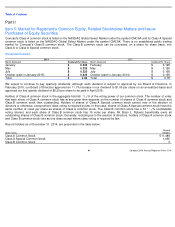 46
46 -
 47
47 -
 48
48 -
 49
49 -
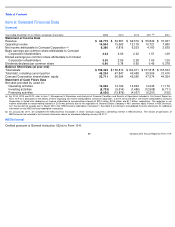 50
50 -
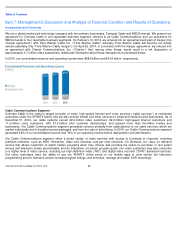 51
51 -
 52
52 -
 53
53 -
 54
54 -
 55
55 -
 56
56 -
 57
57 -
 58
58 -
 59
59 -
 60
60 -
 61
61 -
 62
62 -
 63
63 -
 64
64 -
 65
65 -
 66
66 -
 67
67 -
 68
68 -
 69
69 -
 70
70 -
 71
71 -
 72
72 -
 73
73 -
 74
74 -
 75
75 -
 76
76 -
 77
77 -
 78
78 -
 79
79 -
 80
80 -
 81
81 -
 82
82 -
 83
83 -
 84
84 -
 85
85 -
 86
86 -
 87
87 -
 88
88 -
 89
89 -
 90
90 -
 91
91 -
 92
92 -
 93
93 -
 94
94 -
 95
95 -
 96
96 -
 97
97 -
 98
98 -
 99
99 -
 100
100 -
 101
101 -
 102
102 -
 103
103 -
 104
104 -
 105
105 -
 106
106 -
 107
107 -
 108
108 -
 109
109 -
 110
110 -
 111
111 -
 112
112 -
 113
113 -
 114
114 -
 115
115 -
 116
116 -
 117
117 -
 118
118 -
 119
119 -
 120
120 -
 121
121 -
 122
122 -
 123
123 -
 124
124 -
 125
125 -
 126
126 -
 127
127 -
 128
128 -
 129
129 -
 130
130 -
 131
131 -
 132
132 -
 133
133 -
 134
134 -
 135
135 -
 136
136 -
 137
137 -
 138
138 -
 139
139 -
 140
140 -
 141
141 -
 142
142 -
 143
143 -
 144
144 -
 145
145 -
 146
146 -
 147
147 -
 148
148 -
 149
149 -
 150
150 -
 151
151 -
 152
152 -
 153
153 -
 154
154 -
 155
155 -
 156
156 -
 157
157 -
 158
158 -
 159
159 -
 160
160 -
 161
161 -
 162
162 -
 163
163 -
 164
164 -
 165
165 -
 166
166 -
 167
167 -
 168
168 -
 169
169 -
 170
170 -
 171
171 -
 172
172 -
 173
173 -
 174
174 -
 175
175 -
 176
176 -
 177
177 -
 178
178 -
 179
179 -
 180
180 -
 181
181 -
 182
182 -
 183
183 -
 184
184 -
 185
185 -
 186
186 -
 187
187 -
 188
188 -
 189
189 -
 190
190 -
 191
191 -
 192
192 -
 193
193 -
 194
194 -
 195
195 -
 196
196 -
 197
197 -
 198
198 -
 199
199 -
 200
200 -
 201
201 -
 202
202 -
 203
203 -
 204
204 -
 205
205 -
 206
206 -
 207
207 -
 208
208 -
 209
209 -
 210
210 -
 211
211 -
 212
212 -
 213
213 -
 214
214 -
 215
215 -
 216
216 -
 217
217 -
 218
218 -
 219
219 -
 220
220 -
 221
221 -
 222
222 -
 223
223 -
 224
224 -
 225
225 -
 226
226 -
 227
227 -
 228
228 -
 229
229 -
 230
230 -
 231
231 -
 232
232 -
 233
233 -
 234
234 -
 235
235 -
 236
236 -
 237
237 -
 238
238 -
 239
239 -
 240
240 -
 241
241 -
 242
242 -
 243
243 -
 244
244 -
 245
245 -
 246
246 -
 247
247 -
 248
248 -
 249
249 -
 250
250 -
 251
251 -
 252
252 -
 253
253 -
 254
254 -
 255
255 -
 256
256 -
 257
257 -
 258
258 -
 259
259 -
 260
260 -
 261
261 -
 262
262 -
 263
263 -
 264
264 -
 265
265 -
 266
266 -
 267
267 -
 268
268 -
 269
269 -
 270
270 -
 271
271 -
 272
272 -
 273
273 -
 274
274 -
 275
275 -
 276
276 -
 277
277 -
 278
278 -
 279
279 -
 280
280 -
 281
281 -
 282
282 -
 283
283 -
 284
284 -
 285
285 -
 286
286 -
 287
287 -
 288
288 -
 289
289 -
 290
290 -
 291
291 -
 292
292 -
 293
293 -
 294
294 -
 295
295 -
 296
296 -
 297
297 -
 298
298 -
 299
299 -
 300
300 -
 301
301 -
 302
302 -
 303
303 -
 304
304 -
 305
305 -
 306
306 -
 307
307 -
 308
308 -
 309
309 -
 310
310 -
 311
311 -
 312
312 -
 313
313 -
 314
314 -
 315
315 -
 316
316 -
 317
317 -
 318
318 -
 319
319 -
 320
320 -
 321
321 -
 322
322 -
 323
323 -
 324
324 -
 325
325 -
 326
326 -
 327
327 -
 328
328 -
 329
329 -
 330
330 -
 331
331 -
 332
332 -
 333
333 -
 334
334 -
 335
335 -
 336
336 -
 337
337 -
 338
338 -
 339
339 -
 340
340 -
 341
341 -
 342
342 -
 343
343 -
 344
344 -
 345
345 -
 346
346 -
 347
347 -
 348
348 -
 349
349 -
 350
350 -
 351
351 -
 352
352 -
 353
353 -
 354
354 -
 355
355 -
 356
356 -
 357
357 -
 358
358 -
 359
359 -
 360
360 -
 361
361 -
 362
362 -
 363
363 -
 364
364 -
 365
365 -
 366
366 -
 367
367 -
 368
368 -
 369
369 -
 370
370 -
 371
371 -
 372
372 -
 373
373 -
 374
374 -
 375
375 -
 376
376 -
 377
377 -
 378
378 -
 379
379 -
 380
380 -
 381
381 -
 382
382 -
 383
383 -
 384
384 -
 385
385 -
 386
386
 |
 |

Table of Contents
tribution or display of copyrighted material negatively affects our ability to generate revenue from the legitimate sale of our content,
as well as from the sale of advertising in connection with our content, and increases our costs due to our active enforcement of our
intellectual property rights. For example, NBCUniversal has brought a suit against a multichannel video provider to challenge the
commercial-
skipping functionality in its DVR. Additionally, legislation has been proposed in the U.S. Congress that seems intended
to legitimize the unauthorized online streaming of local broadcast content. We cannot predict whether such legislation will be
enacted or how any such legislation would ultimately affect our businesses.
Piracy and other unauthorized uses of content are made easier, and the enforcement of intellectual property rights more
challenging, by technological advances allowing the conversion of programming, films and other content into digital formats, which
facilitates the creation, transmission and sharing of high-
quality unauthorized copies. In particular, piracy of programming and films
through unauthorized distribution on DVDs, peer-to-
peer computer networks and other platforms continues to present challenges
for our cable networks, broadcast television and filmed entertainment businesses. While piracy is a challenge in the United States,
it is particularly prevalent in many parts of the world that lack developed copyright laws, effective enforcement of copyright laws and
technical protective measures like those in effect in the United States. If any U.S. or international laws intended to combat piracy
and protect intellectual property rights are repealed or weakened or are not adequately enforced, or if the legal system fails to adapt
to new technologies that facilitate piracy, we may be unable to effectively protect our rights, and the value of our intellectual
property may be negatively impacted and our costs of enforcing our rights may increase. See Item 1, Business and refer to the
“Legislation and Regulation — Other Areas of Regulation — Intellectual Property” discussion for additional information.
Acquisitions and other strategic transactions present many risks, and we may not realize the financial and strategic goals
that were contemplated at the time of any transaction.
From time to time we make acquisitions and investments and enter into other strategic transactions, including our planned
transactions with Time Warner Cable and Charter. In connection with such acquisitions and strategic transactions, we may incur
unanticipated expenses, fail to realize anticipated benefits, have difficulty incorporating the acquired businesses, disrupt
relationships with current and new employees, customers and vendors, incur significant debt, or have to delay or not proceed with
announced transactions such as the Time Warner Cable or Charter transactions. Additionally, regulatory agencies, such as the
FCC or DOJ, may impose additional restrictions on the operation of our business as a result of our seeking regulatory approvals for
any significant acquisitions and strategic transactions. The occurrence of any of these events could have an adverse effect on our
businesses.
Labor disputes, whether involving employees or sports organizations, may disrupt our operations and adversely affect
our businesses.
Many of NBCUniversal’
s employees, including writers, directors, actors, technical and production personnel and others, as well as
some of our on-air and creative talent and cable communications’
employees, are covered by collective bargaining agreements or
works councils. Most of NBCUniversal
’s collective bargaining agreements are industry-
wide agreements, and we may lack practical
control over the negotiations and terms of the agreements. If we are unable to reach agreement with a labor union before the
expiration of a collective bargaining agreement, our employees who were covered by that agreement may have a right to strike or
take other actions that could adversely affect us, which could disrupt our operations and reduce our revenue, and the resolution of
any disputes may increase our costs. There can be no assurance that we will renew our collective bargaining agreements as they
expire or that we can renew them on favorable terms or without any work stoppages.
37
Comcast 2014 Annual Report on Form 10
-
K
